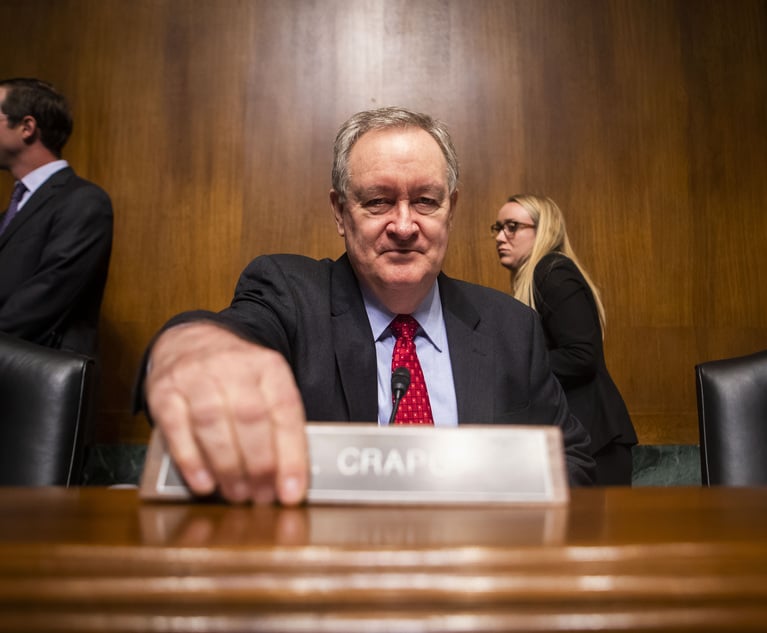Jones Day Remains Locked in Court Battle With Plaintiffs Suing Firm Over Bias Claims
The firm's "efforts to avoid court scrutiny into its 'black box' policies and practices should end now," plaintiffs argued in their latest court filing.
October 29, 2019 at 04:08 PM
3 minute read
 Jones Day offices in Washington, D.C. Photo: Diego M. Radzinschi/ALM
Jones Day offices in Washington, D.C. Photo: Diego M. Radzinschi/ALM
The plaintiffs who have accused Jones Day of systemically discriminating against women lawyers have expanded on their arguments against the firm, claiming in a 54-page court filing that the firm is trying to avoid court scrutiny of its black box compensation structure that has permitted discrimination.
The filing in the last week augments a number of the claims the plaintiffs—Nilab Rahyar Tolton, Andrea Mazingo, Meredith Williams, Saira Draper, Jaclyn Stahl and Katrina Henderson—made in their third amended complaint while countering Jones Day's defense.
The parties are continuing to lob arguments against each other ahead of a major court ruling that could decide how much of the case will proceed. The plaintiffs are asking U.S. District Judge Randolph Moss of the District of Columbia to reject Jones Day's motion for partial summary judgment, filed in July, in which the firm asserted that some of the plaintiffs' claims in their $200 million proposed class action should be dismissed outright.
"Jones Day cannot rewrite the pleading standard or plaintiffs' pleadings to evade discovery into plaintiffs' well-pleaded claims of its longstanding pattern and practice of discrimination and retaliation," the plaintiffs wrote in an Oct. 24 filing. "Defendant's efforts to avoid court scrutiny into its 'black box' policies and practices should end now with this court's denial of its motion."
Jones Day has argued that New York City Human Rights Law claims made by Henderson, a three-year associate at Jones Day who is now an attorney for Amazon's television production arm in California, were time-barred.
The plaintiffs disputed that assertion in their Oct. 24 memo, arguing that the three-year statute of limitations on the city's Human Rights Law didn't begin tolling for Henderson until mid-July 2016, when she was allegedly wrongfully terminated from the firm.
Jones Day has also contended that the plaintiffs' claims under the federal Equal Pay Act are too vague and should be dismissed. But the plaintiffs argued that, at this point in the proceedings, they don't have to be that specific.
"Defendant's characterization of the EPA claims of plaintiffs Tolton, Draper, Williams, and Henderson as 'conclusory allegations' also misses the mark," their latest court filing said. "Plaintiffs are not required at this stage to provide the salaries of named comparators or to plead detailed, factual information to substantiate claims that they did substantially equal work. Jones Day's arguments to the contrary."
Kate Mueting, a co-chair of Sanford Heisler Sharp's Title VII practice group in Washington, D.C., and one of the plaintiffs' attorneys, told The National Law Journal that they "look forward to proceeding with class-wide discovery in this matter."
Jones Day is also battling discrimination claims from another set of plaintiffs, a married couple who previously practiced at the firm. They are suing their former employer for allegedly maintaining discriminatory parental leave policies and retaliating against the husband when he complained about it.
Most recently in that case, Mark Savignac and Julia Sheketoff asserted in an 18-page court filing that Jones Day's lawyers have raised new arguments that are "as meritless as the now-abandoned arguments they replace." Savignac and Sheketoff were further responding to attempts to dismiss their case by Jones Day.
Lawyers for Jones Day did not return requests for comment as of press time.
This content has been archived. It is available through our partners, LexisNexis® and Bloomberg Law.
To view this content, please continue to their sites.
Not a Lexis Subscriber?
Subscribe Now
Not a Bloomberg Law Subscriber?
Subscribe Now
NOT FOR REPRINT
© 2025 ALM Global, LLC, All Rights Reserved. Request academic re-use from www.copyright.com. All other uses, submit a request to [email protected]. For more information visit Asset & Logo Licensing.
You Might Like
View All
Senator Plans to Reintroduce Bill to Split 9th Circuit

Three Akin Sports Lawyers Jump to Employment Firm Littler Mendelson

Brownstein Adds Former Interior Secretary, Offering 'Strategic Counsel' During New Trump Term
2 minute readTrending Stories
Who Got The Work
J. Brugh Lower of Gibbons has entered an appearance for industrial equipment supplier Devco Corporation in a pending trademark infringement lawsuit. The suit, accusing the defendant of selling knock-off Graco products, was filed Dec. 18 in New Jersey District Court by Rivkin Radler on behalf of Graco Inc. and Graco Minnesota. The case, assigned to U.S. District Judge Zahid N. Quraishi, is 3:24-cv-11294, Graco Inc. et al v. Devco Corporation.
Who Got The Work
Rebecca Maller-Stein and Kent A. Yalowitz of Arnold & Porter Kaye Scholer have entered their appearances for Hanaco Venture Capital and its executives, Lior Prosor and David Frankel, in a pending securities lawsuit. The action, filed on Dec. 24 in New York Southern District Court by Zell, Aron & Co. on behalf of Goldeneye Advisors, accuses the defendants of negligently and fraudulently managing the plaintiff's $1 million investment. The case, assigned to U.S. District Judge Vernon S. Broderick, is 1:24-cv-09918, Goldeneye Advisors, LLC v. Hanaco Venture Capital, Ltd. et al.
Who Got The Work
Attorneys from A&O Shearman has stepped in as defense counsel for Toronto-Dominion Bank and other defendants in a pending securities class action. The suit, filed Dec. 11 in New York Southern District Court by Bleichmar Fonti & Auld, accuses the defendants of concealing the bank's 'pervasive' deficiencies in regards to its compliance with the Bank Secrecy Act and the quality of its anti-money laundering controls. The case, assigned to U.S. District Judge Arun Subramanian, is 1:24-cv-09445, Gonzalez v. The Toronto-Dominion Bank et al.
Who Got The Work
Crown Castle International, a Pennsylvania company providing shared communications infrastructure, has turned to Luke D. Wolf of Gordon Rees Scully Mansukhani to fend off a pending breach-of-contract lawsuit. The court action, filed Nov. 25 in Michigan Eastern District Court by Hooper Hathaway PC on behalf of The Town Residences LLC, accuses Crown Castle of failing to transfer approximately $30,000 in utility payments from T-Mobile in breach of a roof-top lease and assignment agreement. The case, assigned to U.S. District Judge Susan K. Declercq, is 2:24-cv-13131, The Town Residences LLC v. T-Mobile US, Inc. et al.
Who Got The Work
Wilfred P. Coronato and Daniel M. Schwartz of McCarter & English have stepped in as defense counsel to Electrolux Home Products Inc. in a pending product liability lawsuit. The court action, filed Nov. 26 in New York Eastern District Court by Poulos Lopiccolo PC and Nagel Rice LLP on behalf of David Stern, alleges that the defendant's refrigerators’ drawers and shelving repeatedly break and fall apart within months after purchase. The case, assigned to U.S. District Judge Joan M. Azrack, is 2:24-cv-08204, Stern v. Electrolux Home Products, Inc.
Featured Firms
Law Offices of Gary Martin Hays & Associates, P.C.
(470) 294-1674
Law Offices of Mark E. Salomone
(857) 444-6468
Smith & Hassler
(713) 739-1250











